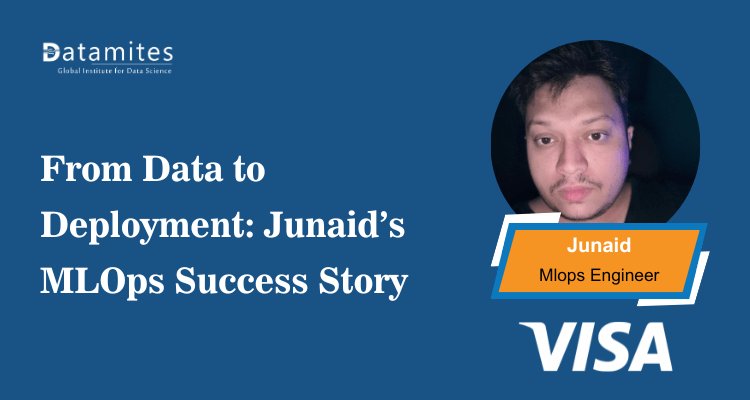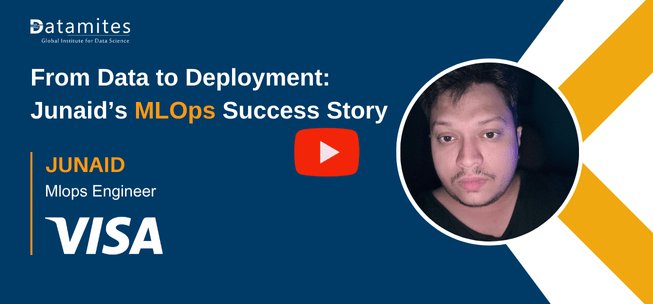Junaid’s Path to MLOps Excellence: Data Meets Deployment
Discover Junaid’s inspiring journey to MLOps excellence where data meets deployment. Learn how he mastered challenges, built expertise, and shares strategies for success in the evolving field of MLOps.

Building machine learning models is only half the journey, the real challenge lies in seamlessly deploying them to deliver impact at scale. This is where MLOps steps in, bridging the gap between data science and real-world applications. Junaid’s story is a perfect example of this transformation. From navigating complex datasets to mastering deployment pipelines, his journey into MLOps showcases how passion, persistence, and the right skills can turn data into actionable intelligence. If you’ve ever wondered how to move from experimentation to execution in the world of AI, Junaid’s path offers both inspiration and a roadmap to success.
Q&A with Junaid: An MLOps Engineer’s Journey, Insights, and Strategies
In this exclusive Q&A, Junaid opens up about his inspiring journey as an MLOps Engineer. From career lessons to industry insights and practical strategies, he shares what it takes to thrive in the evolving world of MLOps.
Q1: Can you introduce yourself and share your background?
I currently work as an MLOps Engineer at Visa, where my role involves scaling models to production-ready environments. I completed my Bachelor’s in Bangalore and later pursued a Master’s at the University of Strathclyde in the UK. Interestingly, I wasn’t a big fan of programming in the early days of my education. However, my curiosity about data and patterns pushed me into Data Science.
Q2: You mentioned you weren’t keen on coding initially. How did you overcome that challenge?
That’s right, I was really bad at programming during engineering. When I first encountered C and C++, I couldn’t even grasp the basics of printf and scanf. Programming felt disconnected and mechanical to me. But after engineering, I started self-learning. My journey began as a Web Developer through a course I joined. From there, I slowly got into Data Structures, Algorithms, and later transitioned into Data Science. What helped me was self-learning and curiosity. Over time, programming became less of a fear and more of a tool to solve real-world problems.
Q3: How has your programming journey evolved across different roles?
Programming requirements change with every role:
- As a Data Analyst: Programming was minimal. Tools like Excel, SQL, and BI dashboards played a bigger role.
- As a Data Scientist: Programming became central. I had to work with Python, statistical models, and libraries like pandas, NumPy, scikit-learn, etc.
- As an MLOps Engineer: The focus is more on optimization, scaling, and deployment. It’s not just about building models but making them production-ready and efficient.
Q4: Many freshers fear programming in Data Science. What advice would you give them?
The most important factor in Data Science is curiosity, not coding. Programming can be learned gradually. Start with fundamentals like:
- Object-Oriented Programming (OOP) concepts
- Data Structures & Algorithms
- Writing clean and optimized code
Don’t enter the field just for money or buzzwords like “I want to build a large language model.” Instead, focus on understanding basics and building a strong foundation.
Q5: What is the difference between Machine Learning (ML) and MLOps?
- Machine Learning (ML): ML is about building models. You take a dataset, identify patterns, and create a statistical model that can predict outputs for similar patterns.
For example, if you train a model on customer purchase data, it can predict future buying behavior.
- MLOps (Machine Learning Operations): MLOps is about scaling and deploying those ML models into real-world production environments. It ensures the model is optimized, reliable, monitored, and automated so it works consistently at scale.
Q6: What is the real difference between MLOps and DevOps?
Many people confuse MLOps with DevOps, but there is a huge difference. DevOps engineers are more generic, they don’t necessarily work with GPUs or understand deep learning optimization.
On the other hand, MLOps engineers deal with scaling ML models, configuring GPUs, optimizing code, and ensuring models can be deployed efficiently to serve thousands or even millions of users. Unlike data scientists who build a model once, MLOps ensures models remain effective by monitoring data drift and fine-tuning them over time.
Q7: What are the biggest trends shaping the AI and data science industry?
Recently, there has been a lot of hype around Generative AI (GenAI). Everyone wants to learn “GenAI with Excel” or “GenAI with Python.” While it’s a great skill, I see GenAI as a co-pilot, a reference tool, not the entire learning journey.
The real long-term trend is mastering the basics first:
- Statistics → forms the foundation.
- Machine Learning & Deep Learning → builds strong core skills.
- GenAI → enhances your toolkit, but should not replace fundamentals.
Q8: What strategies helped you grow in your career?
- Curiosity & Consistency: I spend 4 hours daily learning or revisiting basics. The moment you think you know it all, your learning stops.
- Skill Over Jobs: There’s no shortage of jobs there’s a shortage of skilled professionals. If you’re truly skilled, companies will pay you what you deserve.
- Invest in Yourself: Courses are good for structured learning, but I personally invested in AWS and hands-on practice when no deep MLOps courses existed.
- Job Strategy: When I join a new company, I already start preparing for the next role. At Visa, I’m working on large-scale projects and aligning my tasks with future goals.
Q9: How did the DataMites curriculum help in your journey?
I took the DataMites program back in 2020, when I was just starting. It gave me a structured roadmap on what to learn, in what order, and how to avoid distractions. At that time, not many dedicated data science programs existed, so it really helped me save time and build a strong foundation.
Q10: What’s your final advice for aspiring data scientists and MLOps engineers?
Keep learning every single day.
- Be curious and humble, there's always more to know.
- Don’t chase trends without learning the fundamentals.
- Think long-term focus on deployment and scalability.
- Most importantly, enjoy the process.
Refer these below articles:
- Marketing Analyst to Generative AI Engineer: Keerthan’s Inspiring Journey
- From Learner to Leader: Chandan’s Inspiring Journey as an AI Lead
- Divya’s AI/ML Journey: From Learning Python to Leading AI Projects
Key Findings from Junaid’s MLOps Journey
Junaid’s journey from Data Analyst to MLOps Engineer is filled with lessons every aspiring professional can learn from. Here are the key takeaways from his career path, challenges, and strategies for success in MLOps.
Career Path:
- Started as a Research Analyst → Data Analyst → Data Scientist → ML Engineer → MLOps Engineer at Visa.
- His curiosity about data and patterns drove the transition into Data Science and eventually MLOps.
Overcoming Programming Challenges:
- Initially struggled with programming in engineering (C/C++).
- Overcame fear through self-learning, starting with web development and gradually mastering Data Structures, Algorithms, and Python.
Programming Across Roles:
- Data Analyst: Minimal coding, mostly Excel, SQL, BI tools.
- Data Scientist: Heavy coding with Python, statistical models, ML libraries.
- MLOps Engineer: Focus on optimization, scalability, deployment, monitoring, and production efficiency.
Advice for Freshers:
- Curiosity > Coding skills in the beginning.
- Build strong fundamentals: OOP, Data Structures, Algorithms, Clean Code.
- Don’t enter the field just for hype or money, focus on long-term skill-building.
ML vs. MLOps:
- ML: Creating models and identifying patterns.
- MLOps: Scaling, deploying, monitoring, and maintaining models in real-world production environments.
Read these below articles:
- How to Choose the Right AI/ML Institute in Hyderabad?
- What is a Convolutional Neural Network?
- What is Artificial General Intelligence (AGI)?
The journey from struggling with programming basics to becoming an MLOps Engineer at a global company like Visa highlights an important truth success in data science and AI isn’t about shortcuts or chasing buzzwords, but about curiosity, persistence, and building strong fundamentals. With the right mindset and continuous learning, the path from a beginner to a skilled data professional is not just possible, it's rewarding.
Artificial Intelligence is playing a pivotal role in Coimbatore’s rapid development, fueling innovation across industries and strengthening its position as an emerging technology hub in South India. With reputed artificial intelligence institutes in coimbatore offering specialized AI programs, students are gaining the expertise required to thrive in today’s digital-first world. As Coimbatore moves closer to becoming a smart city, AI is shaping advancements in urban planning, traffic management, and sustainable development, making it a cornerstone of the city’s future.
DataMites stands out as a top artificial intelligence institute in ahmedabad providing comprehensive training in AI, Machine Learning, and Data Science. The institute emphasizes hands-on learning, supported by globally recognized certifications from IABAC and NASSCOM FutureSkills. To further empower learners, DataMites also offers career-focused services such as resume building, interview preparation, and dedicated placement assistance.

